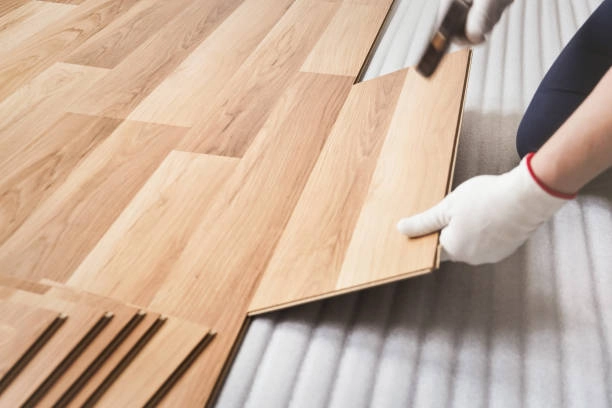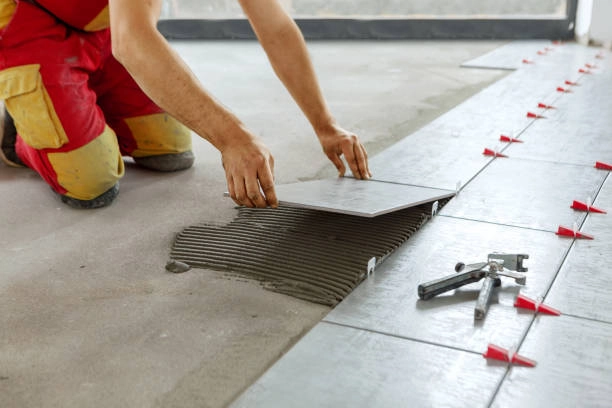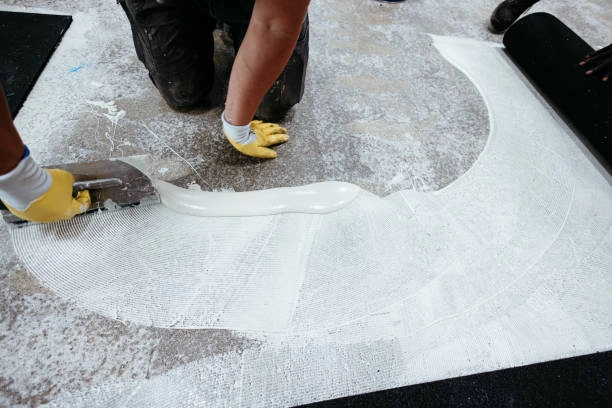Creating floors that endure the test of time is essential for businesses of all sizes. The right flooring doesn’t only look good; it also withstands constant use, resists damage, and requires minimal maintenance. Commercial flooring contractors have a wealth of experience in selecting and installing floors built to last. Here, we’ll reveal some of their secrets to achieving durability, longevity, and functionality in commercial flooring.

Understanding Your Flooring Needs: The Foundation of Long-Lasting Floors
One of the first secrets to achieving a long-lasting floor is understanding the specific needs of your commercial space. Flooring contractors analyze key factors, such as:
- Foot Traffic: Busy areas require materials that resist wear and tear.
- Moisture Levels: Some environments, like restaurants or bathrooms, face high moisture exposure and need water-resistant floors.
- Budget and Aesthetic Preferences: Commercial flooring contractors can provide affordable options that look great without compromising durability.
The selection process is crucial. Choosing the wrong material can lead to premature wear or expensive repairs, while the right choice can ensure your floors stay in top shape for years.
Choosing the Right Materials: Quality Matters
Not all flooring materials are created equal. Commercial flooring contractors emphasize the importance of selecting the right material for each unique environment. Here are some popular and durable options they often recommend:
1. Epoxy Flooring
Epoxy is a top choice for heavy-duty environments like warehouses, factories, and hospitals. Its benefits include:
- High durability: Epoxy can withstand significant impact, making it ideal for areas with heavy equipment or machinery.
- Resistance to chemicals and spills: Epoxy floors are easy to clean and resistant to most industrial chemicals, oils, and spills.
- Smooth and safe: Epoxy can be textured to provide slip resistance, which is especially important in high-traffic or industrial settings.
2. Vinyl and Luxury Vinyl Tile (LVT)
Vinyl flooring has evolved significantly, now offering durability and style that fits seamlessly into various commercial spaces. Contractors often recommend vinyl or LVT for areas like offices, hotels, and retail stores, thanks to their resilience and design flexibility. Commercial flooring contractors find vinyl to be an excellent choice for high-traffic spaces, as it combines functionality with a modern aesthetic.
- It’s waterproof: Vinyl flooring is water-resistant, making it a suitable option for areas with high moisture levels.
- Comfortable underfoot: Unlike harder materials, vinyl has a slight give, providing more comfort.
- Variety in appearance: Vinyl mimics natural materials like wood or stone without the associated maintenance needs.
3. Commercial Carpet Tiles
Carpet tiles are a popular choice for offices, conference rooms, and lounges, providing comfort along with a variety of design options that let businesses personalize their spaces. Commercial flooring contractors often recommend carpet tiles for their versatility and easy maintenance, making them ideal for high-traffic areas that require both style and durability.
- Easy replacement: Contractors can easily replace worn or stained tiles without overhauling the entire floor.
- Sound insulation: Carpet tiles help reduce noise levels, creating a quieter and more pleasant work environment.
Expert Installation: The Key to Longevity
Even the best materials can fail prematurely if not installed correctly. Professional installation is a vital aspect of ensuring your floors last, and commercial flooring contractors follow meticulous steps to guarantee the highest standard of work:
- Preparing the Subfloor: An even, moisture-free subfloor is essential to prevent warping, cracking, or shifting. Contractors may use moisture barriers and other underlayment materials to improve longevity.
- Precision in Measurement and Layout: For materials like tile, hardwood, or LVT, accuracy in measurements and layout can impact both the appearance and durability of the floor.
- Choosing the Right Adhesive: Floors exposed to heavy foot traffic or moisture require specific adhesives to maintain strong bonds over time. Contractors select adhesives that match the demands of each space.
- Sealing and Finishing: Proper sealing protects materials like concrete, hardwood, and natural stone from wear and environmental factors. Floor sealing also enhances resistance to scratches, moisture, and stains.

Maintenance Tips from Flooring Contractors for Lasting Results
Commercial flooring contractors advise regular maintenance routines to extend the life of your flooring. Here are a few expert tips:
1. Daily Cleaning
- Regular sweeping or vacuuming: Removing debris and dirt prevents scratches and maintains appearance.
- Mopping: Floors in high-traffic areas should be damp-mopped daily. Be mindful of using appropriate cleaners to avoid damaging finishes.
2. Quarterly and Annual Deep Cleaning
Contractors often recommend a more thorough cleaning every few months, depending on traffic. This can include professional-grade carpet cleaning, floor waxing, or deep cleaning of epoxy and tile floors.
3. Repair and Replacement
Cracks, scratches, and stains should be promptly addressed to prevent more extensive damage. For instance, replacing damaged tiles right away and resealing worn epoxy helps restore its protective qualities. Commercial flooring contractors often offer maintenance programs, making it straightforward for businesses to keep their floors in top condition and extend their lifespan.
Using Technology for Better Flooring Solutions
Modern flooring contractors often use technology to enhance durability and minimize disruptions during installation and maintenance. Here’s how they leverage advanced tools to create robust flooring systems:
- Digital Floor Mapping: Using digital layouts, contractors ensure accurate material measurement and optimal layouts, minimizing waste and improving results.
- Moisture Meters and Scanners: These devices measure subfloor moisture levels before installation, preventing issues like warping or mold growth.
- Self-Leveling Compounds: Self-leveling technology creates perfectly even subfloors, preventing uneven wear and extending the life of the flooring.
Why Professional Expertise is Crucial
Commercial flooring contractors like A1 Construction bring more than just installation skills. Their expertise is invaluable for making informed choices that impact your floor’s performance, appearance, and longevity. A1 Construction considers factors that non-professionals might overlook, such as subfloor compatibility, adhesive selection, and material wear ratings, ensuring a long-lasting, high-quality floor.
Choosing the Right Contractor: What to Look For
When selecting a commercial flooring contractor, look for these essential qualities:
- Experience with Different Flooring Types: Contractors experienced with materials like epoxy, vinyl, and tile can provide insights into the best options for various settings.
- Proven Track Record: Check reviews, case studies, and references to see how contractors have achieved durable results for similar businesses.
- Transparent Communication: A good contractor will explain each step of the process, including costs, timelines, and maintenance expectations.
Secrets to Saving Costs While Ensuring Durability
While some materials may have a higher upfront cost, commercial flooring contractors often emphasize the importance of investing in quality products for long-term savings. Here’s how they help businesses save money without sacrificing quality:
- Choosing Low-Maintenance Options: Materials like vinyl and epoxy require less maintenance than others, saving on long-term upkeep costs.
- Smart Repairs and Replacements: Contractors may suggest modular flooring like carpet tiles or LVT that allow for targeted repairs.
- Preventative Maintenance Plans: Contractors often offer maintenance packages that help businesses keep their floors in optimal condition, preventing costly repairs.
Sustainability and Eco-Friendly Choices
More businesses are seeking eco-friendly options for their commercial spaces, and flooring contractors are responding with sustainable solutions. Some durable, eco-friendly flooring options include:
- Recycled Carpet: Many commercial carpets are made from recycled materials, offering a sustainable option without sacrificing quality.
- Bamboo and Cork: While less common, bamboo and cork are sustainable, durable options that work well in spaces seeking a unique aesthetic.
- Low-VOC (Volatile Organic Compound) Materials: Many modern vinyl and epoxy floors are low in VOCs, improving indoor air quality and contributing to a healthier work environment.

Durability in commercial flooring involves more than just selecting quality materials it’s a blend of top-grade products, skilled installation, and regular upkeep. Commercial flooring contractors bring invaluable expertise to guide your choices, from recommending the ideal materials to ensuring flawless installation and long-term maintenance. Investing in the right flooring solution with a reliable contractor helps you create a commercial space that’s both visually impressive and resilient.
Whether you’re considering vinyl, epoxy, carpet, or tile, let these contractor insights lead to floors that withstand the demands of your business and contribute to its success. Contact us today to learn more about flooring and remodeling.
Frequently Asked Questions
1. What are the most durable types of commercial flooring for high-traffic areas?
Epoxy and vinyl are among the most durable choices for high-traffic commercial spaces. Commercial flooring contractors often recommend epoxy for heavy-duty settings like warehouses because of its impact resistance, while vinyl and luxury vinyl tiles (LVT) are ideal for offices, hotels, and retail spaces, thanks to their resilience and design flexibility.
2. How can a hardwood flooring contractor help maintain the floors in my commercial space?
A hardwood flooring contractor can assist with initial installation, regular maintenance, and refinishing to ensure longevity. They can also apply finishes that protect against scratches and wear, keeping the floors in top condition even in areas with moderate traffic.
3. What factors should I consider when choosing flooring contractors near me for a commercial project?
When selecting flooring contractors near you, consider their experience with commercial projects, knowledge of durable materials, and track record of successful installations. Working with reputable commercial flooring contractors can make a difference, as they bring expertise in delivering high-quality, long-lasting results. Checking their references and reviews can further ensure they have successfully met the needs of other businesses.
4. How does regular maintenance from floor repair contractors extend the life of my flooring?
Floor repair contractors offer maintenance programs that prevent minor issues from becoming costly repairs. Routine care, such as cleaning, resealing, and replacing damaged areas, keeps floors looking and performing well. Contractors also assess wear patterns and address potential concerns early to avoid major renovations.
5. Why do epoxy flooring contractors recommend epoxy for industrial and high-traffic settings?
Epoxy flooring contractors favor epoxy for its exceptional durability, resistance to chemicals, and easy maintenance. It’s especially useful in industrial settings where floors must withstand heavy machinery, spills, and daily impact. Epoxy can also be textured to reduce slipping in busy areas.
6. What are the benefits of choosing modular flooring options like carpet tiles or LVT for commercial spaces?
Modular flooring options like carpet tiles and LVT allow for easy replacement of specific sections, which is cost-effective and minimizes downtime. This versatility makes them ideal for high-traffic areas that may need periodic updates without requiring a full floor overhaul.
7. Are there eco-friendly commercial flooring options available?
Yes, many eco-friendly options exist for commercial spaces. Recycled carpet, bamboo, cork, and low-VOC vinyl provide sustainable choices without compromising on durability. Commercial flooring contractors can help identify and source materials that align with both durability needs and environmental goals.
